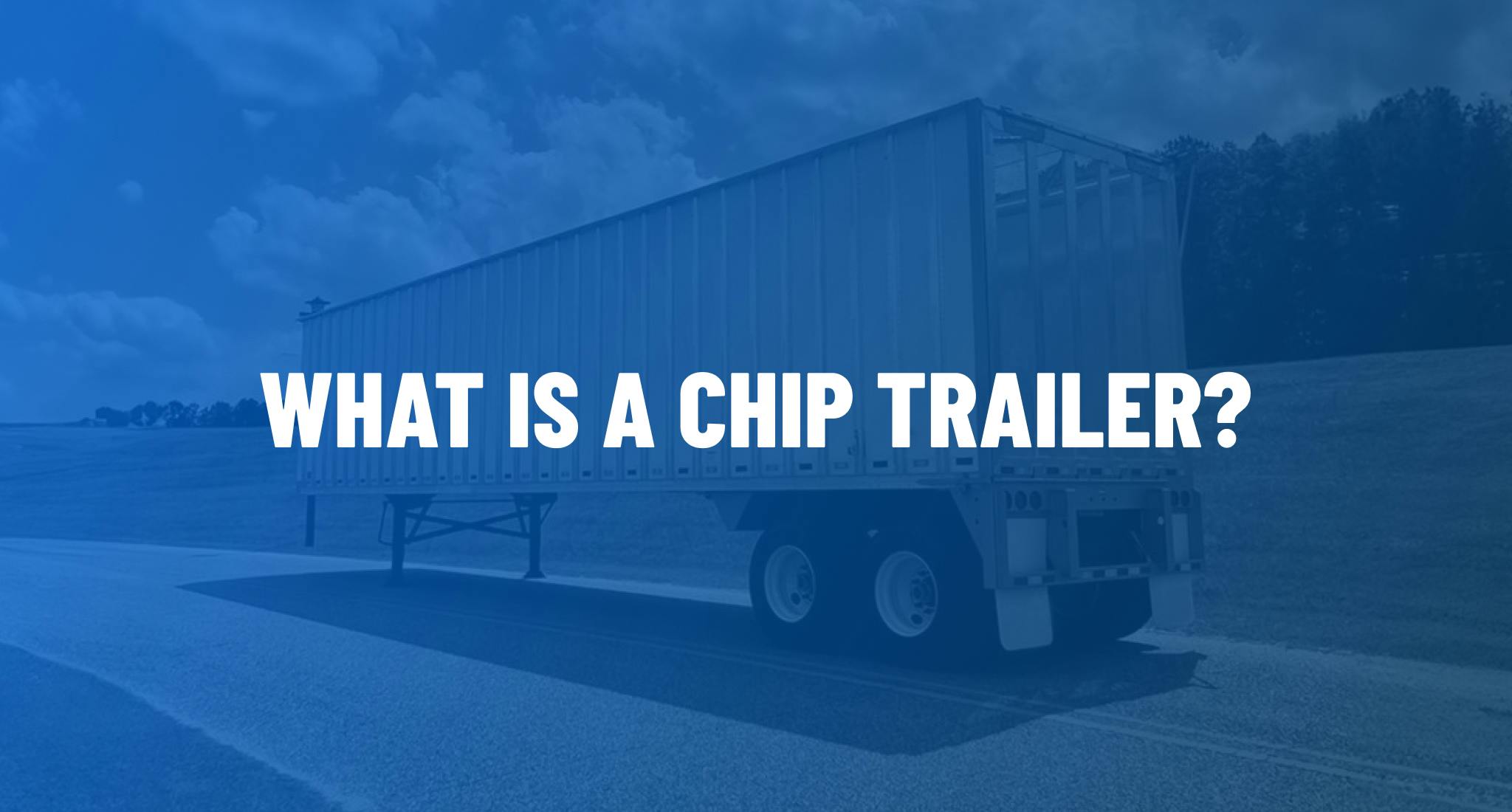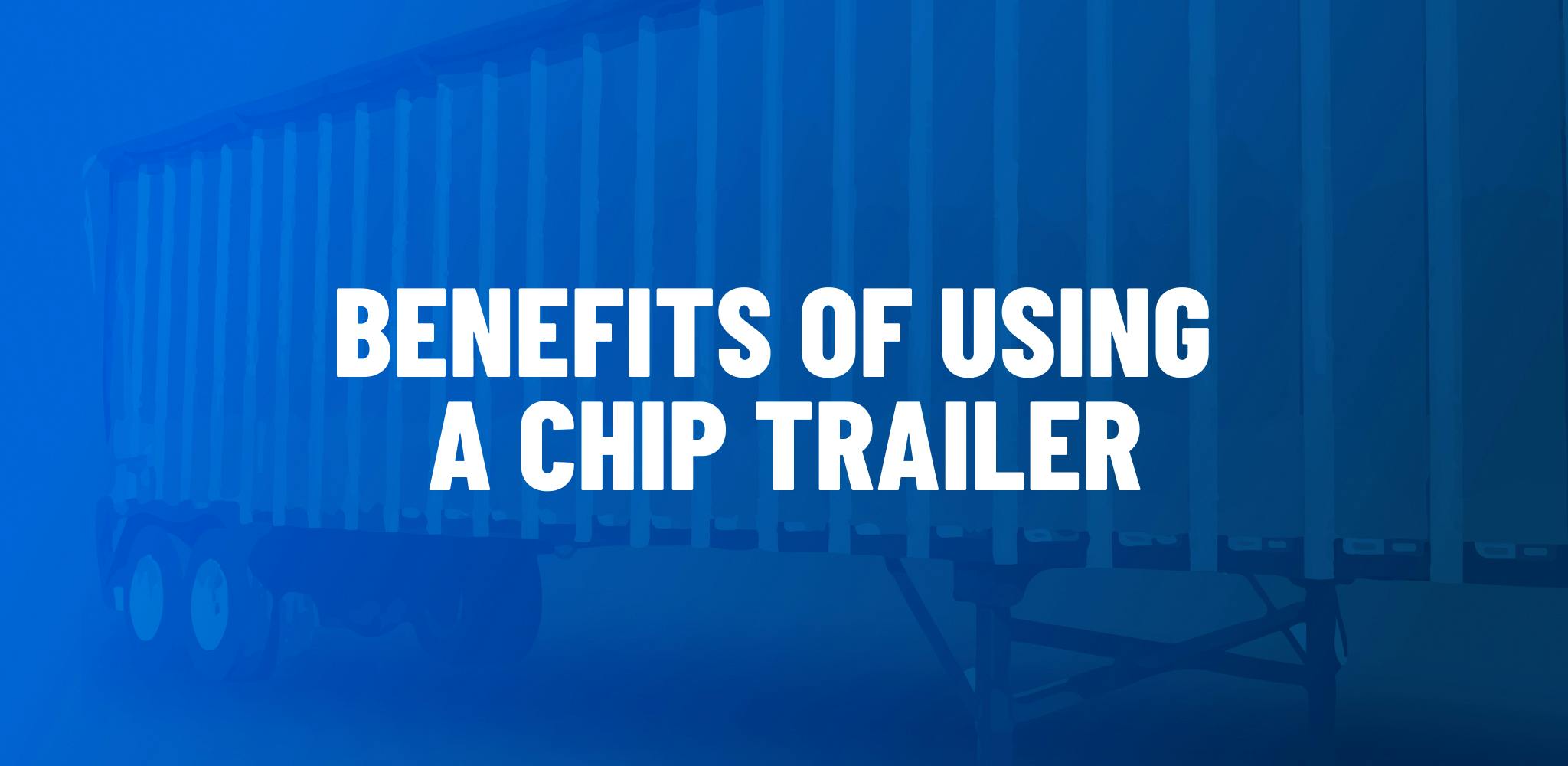What Is a Chip Trailer?
January 31st, 2024

A chip trailer is designed for transporting bulk materials like wood chips, sawdust, bark, shavings, and other small materials.
Chip trailers are essential in industries like forestry, where they play a crucial role in moving wood biomass and residuals from harvesting sites to processing facilities. Their unique design allows for efficient loading, transportation, and unloading of lightweight, yet bulky materials.
If you work in logistics, understanding the functionality and importance of chip trailers helps in appreciating their role in the supply chain of various industries, especially those reliant on wood-based products.
What Chip Trailers Are and Why They Are Important.
Chip trailers are defined by their large volume capacity and lightweight yet durable designs, which allows for easy loading and unloading of lightweight yet voluminous materials. They play a critical role in industries in which moving large quantities of bulky yet lightweight materials is a daily necessity.
The importance of chip trailers extends beyond just transportation. They contribute to the operational efficiency of almost every industry that relies on them. Chip trailers enable the movement of large volumes of product in a single trip, which can reduce transportation costs and time.
Uses of Chip Trailers
The forest industry utilizes chip trailers to transport materials like wood chips from logging sites to paper mills or biomass power plants. The agricultural and recycling industries also utilize chip trailers. In agriculture, workers transport bulk materials like straw or feed. In recycling, they are often seen carrying bulk recycled materials.
The versatility of chip trailers in handling different types of loose, bulk materials makes them an asset in several industries. Their design ensures that materials are transported safely and efficiently, minimizing loss during transit, and contributing to smoother operations in sectors reliant on the movement of small bulk goods.
Different Types of Chip Trailers
Chip trailers are designed for specific cargo needs. They come in various sizes and capacities, ranging from smaller trailers with 20 to 30 cubic meter capacities to large models that can hold up to 160 cubic meters or more. Some chip trailers have additional features, such as tarps to cover the load, built-in hydraulic lift systems, or compartmentalization for different types of chips.
Some of the most well-known variations of chip trailers include possum belly, open-top, closed-top, and walking floor models:
- Possum belly trailers have extra storage beneath the main deck.
- Open-top trailers simplify loading with their roofless design and tarp or net covers.
- Closed-top trailers are rear-loading and provide a hard cover.
- Walking floor trailers have a self-loading and unloading mechanism.
Possum Belly Chip Trailers
A possum belly chip trailer has an open top and a sloped under-deck storage area that allows these trailers to haul more chips per load. The sloped belly profile increases overall cargo capacity compared to a standard flatbed.
Open-Top Chip Trailers
An open-top chip trailer does not have a permanently attached roof or cover over the cargo area. They rely on tarps or nets stretched over the top to secure chips during transport, if necessary. The sides are typically straight up and down to maximize cubic load space. As their name implies, open-top trailers enable you to load chips directly from the top.
Closed-Top Chip Trailers
Closed-top chip trailers, sometimes called “chip boxes,” are fully enclosed walk-in trailers that protect wood chip loads from weather, debris, and spillage during transport. Closed tops enable you to load chips from the rear, and they have a locking rear door that seals closed to prevent chips from blowing out.
Tip: Closed-top chip trailers are often a more secure choice than open-top trailers, as tarps or nets could allow small, lightweight materials (such as sawdust) to spill from the trailer during transport. Tarps or nets on open-top trailers could also damage more easily during the loading process, especially if they’re used to keep in chips as they’re blown from a woodchipper.
Walking Floor Chip Trailers
Walking floor chip trailers utilize a movable conveyor belt floor system to self-load and unload wood chips. The conveyors “walk” the chips in and out of the rear door. Walking floors enable rapid loading and unloading without tilting the trailer or additional equipment. The enclosed design shelters chips and enables versatile delivery options.
Benefits of Using a Chip Trailer

Chip trailers bring a host of benefits to a wide variety of industries. Here’s a look at how a chip trailer can benefit your logistics operation:
- Increased Efficiency: Chip trailers are designed for quick loading and unloading, significantly reducing turnaround times and increasing operational efficiency.
- Enhanced Safety:Their specialized designs, like the walking floor mechanism, minimize the need for manual handling, reducing the risk of accidents and injuries.
- Higher Capacity: With options like possum belly trailers, chip trailers offer increased capacity to transport more materials per trip.
- Versatility: Chip trailers are versatile so you can use them for hauling a variety of bulk materials, not just wood chips. This makes them suitable for diverse industries.
- Cost-Effectiveness: By maximizing load capacity and reducing labor costs, chip trailers offer a cost-effective solution for bulk material transportation.
How Much Does a Chip Trailer Cost?
The cost of a chip trailer can vary widely based on its features, condition, and capacity. Prices generally range from around $10,000 for basic, used models to more than $100,000 for new, high-end trailers equipped with advanced features.
Factors like the trailer’s size, material capacity, and additional features like walking floors or hydraulic unloading mechanisms can significantly influence the price.
Should You Invest in a Chip Trailer?
Investing in a chip trailer can be a wise decision, especially for businesses involved in bulk material transportation. These trailers offer high efficiency and safety, with the ability to transport large volumes of materials like wood chips, biomass, and other bulk goods.
If you’re considering investing in a chip trailer, weigh the initial against the long-term benefits of increased capacity, operational efficiency, and potential cost savings that your trailer will provide. For businesses looking to optimize their bulk material transportation, a chip trailer can be an asset.
FAQs
How do chip trailers unload?
Chip trailers typically unload using a hydraulic lift system or a walking floor mechanism. The hydraulic lift tilts the trailer to slide the chips out, while the walking floor system uses a conveyor belt-style moving floor to “walk” the material out. These methods ensure efficient, safe unloading, especially for large volumes of lightweight materials like wood chips.
How many yards does a chip trailer hold?
The capacity of a chip trailer varies depending on its size and design. On average, a standard chip trailer from Hale Trailer can hold roughly 130 cubic yards of material. Our larger, more specialized trailers, like our possum belly models, can hold roughly 160 cubic yards.
How much does a chip trailer weigh?
The total weight, when loaded with material, will depend on the trailer’s capacity and the density of the material being transported. Always check weight regulations along your route to make sure your cargo stays under the maximum mandated weight.[ML1]
Learn More with Hale Trailer
Hale Trailer is here to help you with all your shipping and logistics needs. Our extensive inventory of trailers, including a variety of chip trailers, caters to a broad range of transportation requirements.
We invite you to explore our selection online or visit one of our locations in person. We’re dedicated to providing you industry-leading equipment and expertise to ensure your logistics operation goes off without a hitch.
All the information on this website – https://www.haletrailer.com – is published in good faith and for general information purposes only. Hale Trailer Brake and Wheel does not make any warranties about the completeness, reliability and accuracy of this information. Any action you take upon the information you find on this website, is strictly at your own risk. Hale Trailer Brake and Wheel will not be liable for any losses and/or damages in connection with the use of our website.
